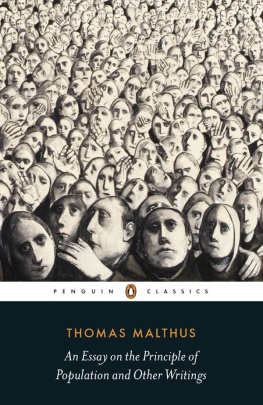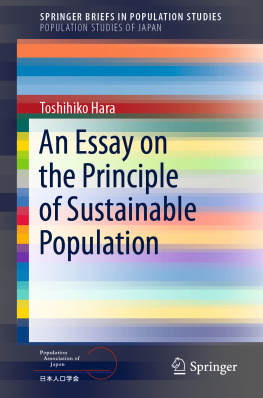Malthus Thomas-Robert - An Essay on the Principle of Population
Here you can read online Malthus Thomas-Robert - An Essay on the Principle of Population full text of the book (entire story) in english for free. Download pdf and epub, get meaning, cover and reviews about this ebook. genre: Science. Description of the work, (preface) as well as reviews are available. Best literature library LitArk.com created for fans of good reading and offers a wide selection of genres:
Romance novel
Science fiction
Adventure
Detective
Science
History
Home and family
Prose
Art
Politics
Computer
Non-fiction
Religion
Business
Children
Humor
Choose a favorite category and find really read worthwhile books. Enjoy immersion in the world of imagination, feel the emotions of the characters or learn something new for yourself, make an fascinating discovery.
- Book:An Essay on the Principle of Population
- Author:
- Genre:
- Rating:5 / 5
- Favourites:Add to favourites
- Your mark:
- 100
- 1
- 2
- 3
- 4
- 5
An Essay on the Principle of Population: summary, description and annotation
We offer to read an annotation, description, summary or preface (depends on what the author of the book "An Essay on the Principle of Population" wrote himself). If you haven't found the necessary information about the book — write in the comments, we will try to find it.
An Essay on the Principle of Population — read online for free the complete book (whole text) full work
Below is the text of the book, divided by pages. System saving the place of the last page read, allows you to conveniently read the book "An Essay on the Principle of Population" online for free, without having to search again every time where you left off. Put a bookmark, and you can go to the page where you finished reading at any time.
Font size:
Interval:
Bookmark:
The Project Gutenberg EBook of An Essay on the Principle of Population, by
Thomas Malthus
This eBook is for the use of anyone anywhere at no cost and with
almost no restrictions whatsoever. You may copy it, give it away or
re-use it under the terms of the Project Gutenberg License included
with this eBook or online at www.gutenberg.net
Title: An Essay on the Principle of Population
Author: Thomas Malthus
Posting Date: July 23, 2009 [EBook #4239]
Release Date: July, 2003
First Posted: December 14, 2001
Last Updated: June 30, 2007
Language: English
*** START OF THIS PROJECT GUTENBERG EBOOK ESSAY--PRINCIPLE OF POPULATION ***
Produced by Charles Aldarondo. HTML version by Al Haines.
AN ESSAY ON THE PRINCIPLE OF POPULATION, AS IT AFFECTS THE FUTURE IMPROVEMENT OF SOCIETY WITH REMARKS ON THE SPECULATIONS OF MR. GODWIN, M. CONDORCET, AND OTHER WRITERS.
LONDON, PRINTED FOR J. JOHNSON, IN ST. PAUL'S CHURCH-YARD, 1798.
The following Essay owes its origin to a conversation with a friend, on the subject of Mr Godwin's essay on avarice and profusion, in his Enquirer. The discussion started the general question of the future improvement of society, and the Author at first sat down with an intention of merely stating his thoughts to his friend, upon paper, in a clearer manner than he thought he could do in conversation. But as the subject opened upon him, some ideas occurred, which he did not recollect to have met with before; and as he conceived that every least light, on a topic so generally interesting, might be received with candour, he determined to put his thoughts in a form for publication.
The Essay might, undoubtedly, have been rendered much more complete by a collection of a greater number of facts in elucidation of the general argument. But a long and almost total interruption from very particular business, joined to a desire (perhaps imprudent) of not delaying the publication much beyond the time that he originally proposed, prevented the Author from giving to the subject an undivided attention. He presumes, however, that the facts which he has adduced will be found to form no inconsiderable evidence for the truth of his opinion respecting the future improvement of mankind. As the Author contemplates this opinion at present, little more appears to him to be necessary than a plain statement, in addition to the most cursory view of society, to establish it.
It is an obvious truth, which has been taken notice of by many writers, that population must always be kept down to the level of the means of subsistence; but no writer that the Author recollects has inquired particularly into the means by which this level is effected: and it is a view of these means which forms, to his mind, the strongest obstacle in the way to any very great future improvement of society. He hopes it will appear that, in the discussion of this interesting subject, he is actuated solely by a love of truth, and not by any prejudices against any particular set of men, or of opinions. He professes to have read some of the speculations on the future improvement of society in a temper very different from a wish to find them visionary, but he has not acquired that command over his understanding which would enable him to believe what he wishes, without evidence, or to refuse his assent to what might be unpleasing, when accompanied with evidence.
The view which he has given of human life has a melancholy hue, but he feels conscious that he has drawn these dark tints from a conviction that they are really in the picture, and not from a jaundiced eye or an inherent spleen of disposition. The theory of mind which he has sketched in the two last chapters accounts to his own understanding in a satisfactory manner for the existence of most of the evils of life, but whether it will have the same effect upon others must be left to the judgement of his readers.
If he should succeed in drawing the attention of more able men to what he conceives to be the principal difficulty in the way to the improvement of society and should, in consequence, see this difficulty removed, even in theory, he will gladly retract his present opinions and rejoice in a conviction of his error.
7 June 1798
Question statedLittle prospect of a determination of it, from the enmity of the opposing partiesThe principal argument against the perfectibility of man and of society has never been fairly answeredNature of the difficulty arising from populationOutline of the principal argument of the Essay
The great and unlooked for discoveries that have taken place of late years in natural philosophy, the increasing diffusion of general knowledge from the extension of the art of printing, the ardent and unshackled spirit of inquiry that prevails throughout the lettered and even unlettered world, the new and extraordinary lights that have been thrown on political subjects which dazzle and astonish the understanding, and particularly that tremendous phenomenon in the political horizon, the French Revolution, which, like a blazing comet, seems destined either to inspire with fresh life and vigour, or to scorch up and destroy the shrinking inhabitants of the earth, have all concurred to lead many able men into the opinion that we were touching on a period big with the most important changes, changes that would in some measure be decisive of the future fate of mankind.
It has been said that the great question is now at issue, whether man shall henceforth start forwards with accelerated velocity towards illimitable, and hitherto unconceived improvement, or be condemned to a perpetual oscillation between happiness and misery, and after every effort remain still at an immeasurable distance from the wished-for goal.
Yet, anxiously as every friend of mankind must look forwards to the termination of this painful suspense, and eagerly as the inquiring mind would hail every ray of light that might assist its view into futurity, it is much to be lamented that the writers on each side of this momentous question still keep far aloof from each other. Their mutual arguments do not meet with a candid examination. The question is not brought to rest on fewer points, and even in theory scarcely seems to be approaching to a decision.
The advocate for the present order of things is apt to treat the sect of speculative philosophers either as a set of artful and designing knaves who preach up ardent benevolence and draw captivating pictures of a happier state of society only the better to enable them to destroy the present establishments and to forward their own deep-laid schemes of ambition, or as wild and mad-headed enthusiasts whose silly speculations and absurd paradoxes are not worthy the attention of any reasonable man.
The advocate for the perfectibility of man, and of society, retorts on the defender of establishments a more than equal contempt. He brands him as the slave of the most miserable and narrow prejudices; or as the defender of the abuses of civil society only because he profits by them. He paints him either as a character who prostitutes his understanding to his interest, or as one whose powers of mind are not of a size to grasp any thing great and noble, who cannot see above five yards before him, and who must therefore be utterly unable to take in the views of the enlightened benefactor of mankind.
In this unamicable contest the cause of truth cannot but suffer. The really good arguments on each side of the question are not allowed to have their proper weight. Each pursues his own theory, little solicitous to correct or improve it by an attention to what is advanced by his opponents.
The friend of the present order of things condemns all political speculations in the gross. He will not even condescend to examine the grounds from which the perfectibility of society is inferred. Much less will he give himself the trouble in a fair and candid manner to attempt an exposition of their fallacy.
Font size:
Interval:
Bookmark:
Similar books «An Essay on the Principle of Population»
Look at similar books to An Essay on the Principle of Population. We have selected literature similar in name and meaning in the hope of providing readers with more options to find new, interesting, not yet read works.
Discussion, reviews of the book An Essay on the Principle of Population and just readers' own opinions. Leave your comments, write what you think about the work, its meaning or the main characters. Specify what exactly you liked and what you didn't like, and why you think so.







